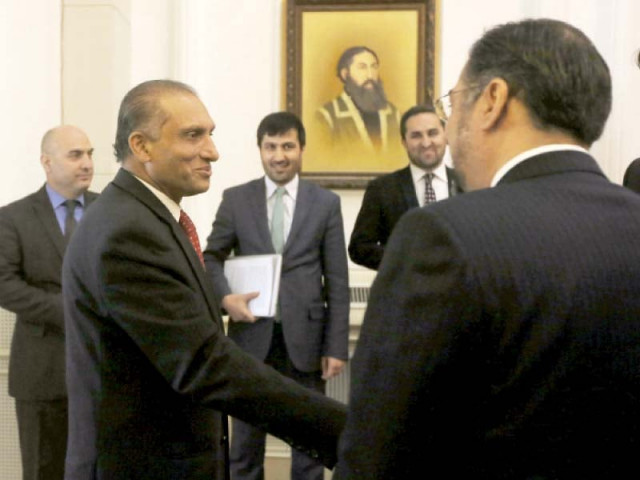Pakistan to host Kabul, Taliban talks in March
Taliban and all Afghan insurgent groups invited to take part

Foreign Secretary Aizaz Chaudhry talks with Afghan Foreign Minister Salahuddin Rabbani in Kabul. PHOTO: REUTERS
Representatives of the Afghan government and Taliban insurgents are expected to meet in Islamabad by the first week of March for their first direct talks since the Murree Peace Process broke down in July, last year.
The announcement by the so-called Quadrilateral Coordination Group (QCG) rekindled hopes for a negotiated end to a long, deadly insurgency in Afghanistan. The Murree initiative had collapsed after the news of death of Taliban’s longtime leader Mullah Omar was leaked to the media.
Following its fourth meeting in Kabul, the QCG, which is made up of officials from Afghanistan, Pakistan, the United States and China, “expressed strong support for the upcoming direct talks between the government of Afghanistan and authorised representatives of the Taliban and other groups”.
In a joint statement released by the Afghan foreign ministry, they said the first round of direct peace talks is expected to take place by the first week of March. “Pakistan has graciously offered to host this round of talks in Islamabad,” the statement added.
A Pakistani official familiar with the development told The Express Tribune that the QCG was seeking a ‘broad-based and all inclusive’ dialogue process.
“That is why not only the Taliban but also other groups, including by Gulbuddin Hekmatyar’s Hizb-e-Islami, have been approached to send their representatives for the peace talks,” the official added.
“All the countries involved in the process are using their leverage to persuade the Taliban and other groups to become part of the peace process,” the official said.
Afghan Deputy Foreign Minister Hekmat Khalil Karzai, Pakistan’s Foreign Secretary Aizaz Ahmad Chaudhry, Chinese Ambassador Yao Jing and US Charge d’Affaires David Lindwall led their respective sides at Tuesday’s meeting.
The QCG also welcomed a decision by Afghanistan and Pakistan to constitute a bilateral joint working group to enlist the support of Ulema of Afghanistan and Pakistan for an Afghan-led and Afghan-owned peace and reconciliation process, including through ‘fatwas’ against ongoing violence.
The QCG agreed to continue joint endeavours as part of their shared commitments to advance the peace and reconciliation process in Afghanistan, the statement said.
It also welcomed Afghan President Ashraf Ghani’s ‘strong statement’ that underlined his administration’s ‘strong commitment’ to peace and reconciliation and called on the Taliban and other groups to join direct talks.
Taking note of the joint statement issued at the conclusion of the February 6 meeting in Islamabad and building on the outcome of previous meetings of the QCG, the quartet reviewed progress in the implementation of the roadmap for an Afghan-led, Afghan-owned peace and reconciliation process.
Earlier speaking at the opening session of the four-nation meeting, the Afghan foreign minister urged the Taliban, Hizb-e-Islami and other groups to join talks. He, however, warned that the groups would face action if they refused to come to the negotiating table.
“As we have done so in the past, we renew our call for all Taliban groups to join the Afghan-led and Afghan-owned talks so we can find political solutions and put an end to violence and bloodshed in our country,” Rabbani said.
He said the priority that the Afghan government attached to a political process was based on and derived from its legitimacy and support from the overwhelming consensus in Afghanistan – both inside and outside the government – on a meaningful, serious, results-oriented peace and reconciliation process.
Rabbani also called for an end to violence for the success of the peace process.
“Among other confidence building measures in this process, we need to see a significant reduction of violence against the Afghan government and people as critically important, and a key determinant and test for the work of this importance mechanism and our overall efforts in support of a results-oriented peace process in Afghanistan,” he said.
The current push for peace in Afghanistan is being seen as significant as the QCG member states fear that ultraorthodox terrorist outfit Islamic State, or Da’ish, could make serious inroads in Afghanistan in the absence of a peace deal.
Published in The Express Tribune, February 24th, 2016.



















COMMENTS
Comments are moderated and generally will be posted if they are on-topic and not abusive.
For more information, please see our Comments FAQ